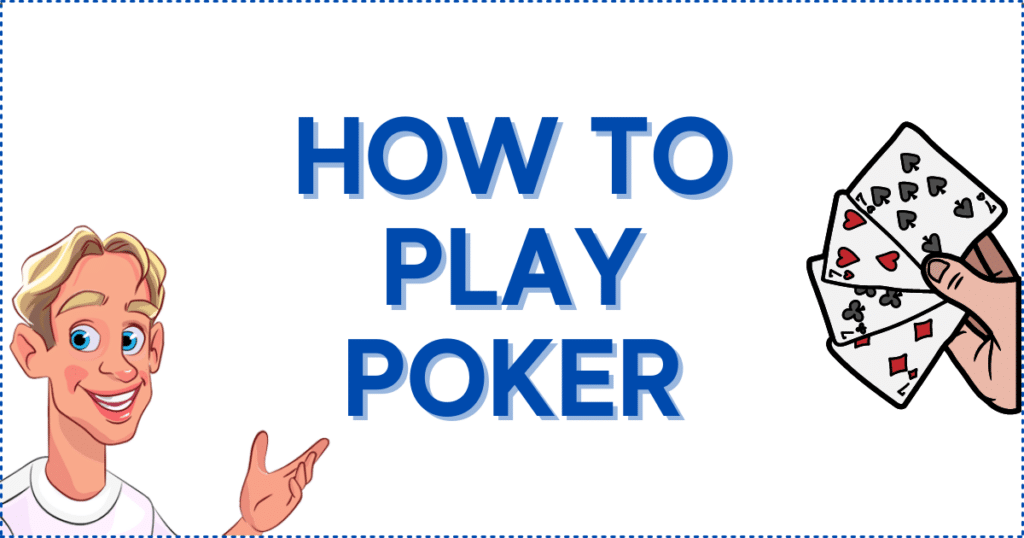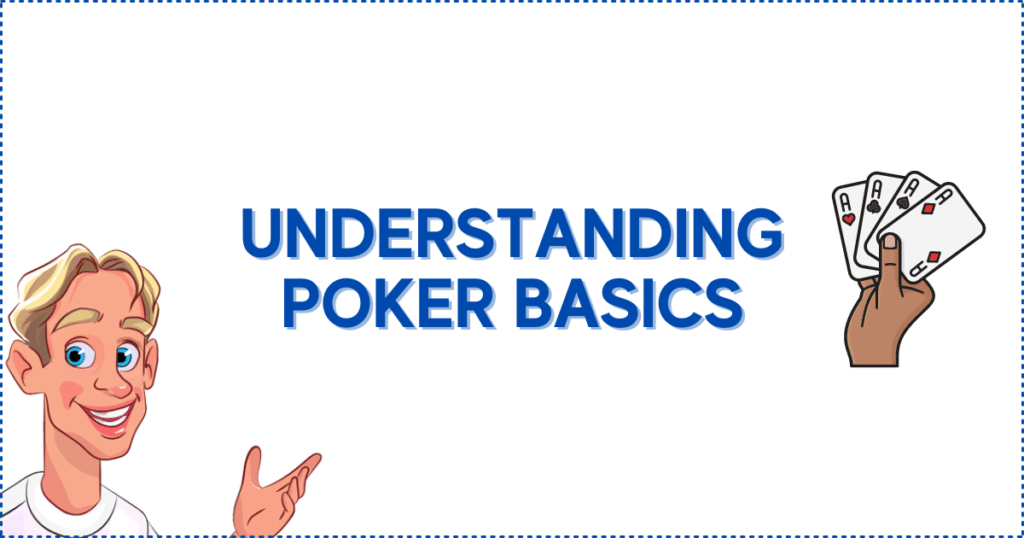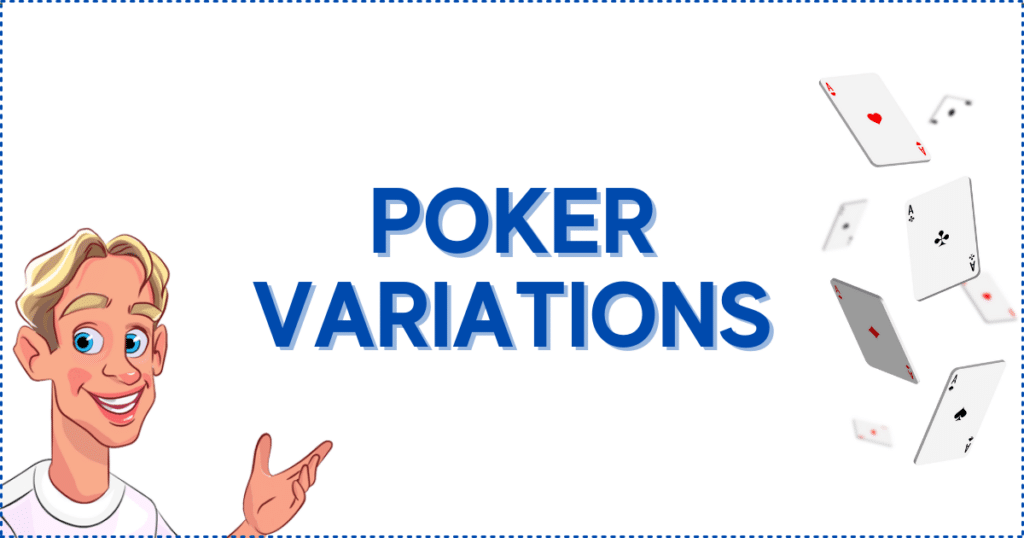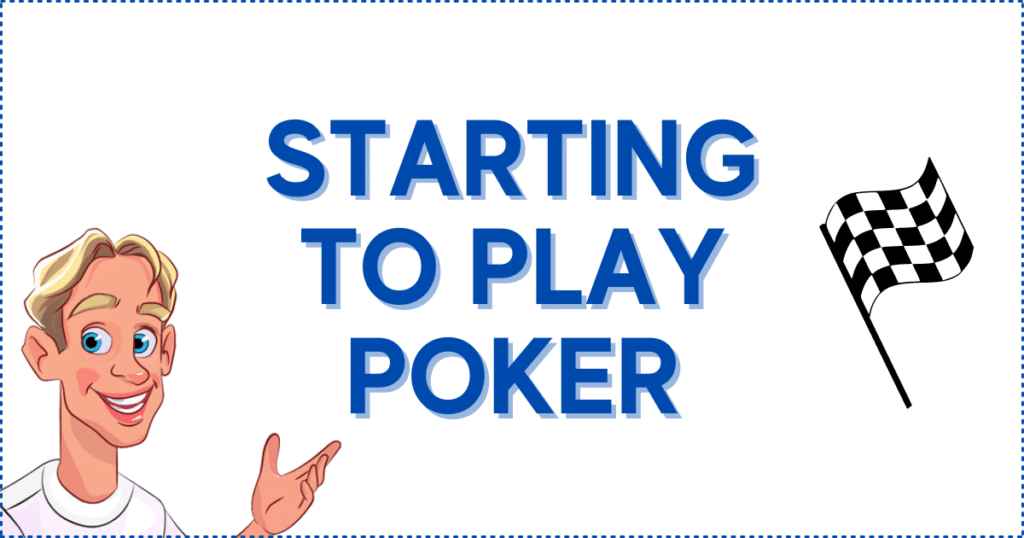How to Play Poker: The Core of It
Poker is a popular card game millions of people enjoy. Canada is no exception to an inflow of new players who want to learn how to play poker. With various poker variants, including Texas Hold'em, Omaha, and Seven-Card Stud, players in Canada can find a game that suits their preferences and skill levels.
In addition to the many options available, the game's competitive and strategic nature attracts players from all walks of life, making it a thrilling pastime for both amateurs and professionals alike.
Before diving into the poker world, it is essential to master its basic rules and strategies and familiarize oneself with the different hand rankings. This knowledge will help you navigate the game confidently and significantly increase your chance of success at the table.
Whether playing at a local casino, participating in an online tournament, or joining a casual game with friends, understanding the fundamentals of online poker in Canada is the key to an enjoyable and rewarding experience.
As you embark on your ‘how to play poker' journey, you'll soon discover much more to the online casino game than just the cards you've been dealt. From effectively managing your poker bankroll to reading your opponents' reactions, countless skills exist to hone and master.
So, take your time to learn and practice. Before you know it, you'll be ready to raise and re-raise the stakes and face your fellow Canadian poker enthusiasts with poise and expertise.

Understanding Poker Basics and Learning How to Play Poker
Poker is a popular card game played in Canada and around the world. It's essential to understand the basic rules and strategies of the game to become a skilled player and learn how to play poker like a pro.
First, it's important to know the poker hand rankings, which determine the strength of your cards. The highest-ranking hand is the Royal Flush, followed by the Straight Flush, Four of a Kind, Full House, Flush, Straight, Three of a Kind, Two Pair, One Pair, and High Card.
The game begins with each player receiving two hole cards, which are kept private. Then, a round of betting occurs, starting with the first player to the left of the dealer.
The player must decide whether to call, fold, or raise. To call means to match the current bet. Fold means to discard your hand and exit the game, while raise means to increase the bet.
After the first betting round, the dealer reveals the flop, which includes three community cards placed face up on the table. Another round of betting follows, and players can use any combination of their hole cards and community cards to create the best possible hand.
Next, the dealer places a fourth community card, known as the turn, on the table. Another round of betting ensues, and players continue to refine their hands using the available cards.
The final community card is called the river, and the dealer places it on the table. The final round of betting occurs where you can go all in, and players must create the strongest hands possible using their hole cards and community cards.
Once the betting concludes, the remaining players enter the showdown stage. Each player reveals their hole cards and the strongest hand claims the pot.
Blinds are an essential part of poker rules, as you will learn if you research how to play poker. They help create action and build the pot. The two players to the left of the dealer button post the small blind and big blind, respectively.
The number of blinds can vary depending on the game limits, but they generally increase as the game progresses.
In summary, understanding the poker basics, such as hand rankings, betting mechanics, and game flow, is crucial to becoming a skilled poker player in Canada.

Popular Poker Variations in Canada
In Canada, poker enthusiasts can enjoy a variety of poker variations if they know how to play poker. Among these popular variations, Texas Hold'em, Omaha, Seven Card Stud, Mixed Games, Draw Poker, and Omaha Hi-Lo stand out as the most commonly played.
Texas Hold'em is by far the most popular and widely played poker game in Canada and around the world.
It offers a combination of simplicity and strategy, with players receiving two hole cards and then working together with five community cards to create the best possible hand. This game can be played in multiple formats, including Limit, No Limit, and Pot-Limit.
Omaha is another popular variation similar to Texas Hold'em but with a unique twist. Each player receives four hole cards instead of two and must use exactly two of these cards along with three community cards to form their best 5-card hand.
This increased number of cards offers more possibilities. It often leads to larger pots when experienced gamblers who know how to play poker are involved.
Omaha Hi-Lo (also known as Omaha 8-or-Better) is an interesting variant of Omaha where the pot is split between the highest and lowest-ranked hands.
In this version, players can use different combinations of hole cards to make both high and low hands, making for exciting gameplay. However, there are specific rules regarding qualifying for the low hand, which adds an extra layer of strategy to the game.
Seven Card Stud is a classic poker variation that was once more popular than Texas Hold'em. In this game, players receive a combination of face-up and face-down cards throughout multiple betting rounds.
The objective is to form the best 5-card hand from the seven cards received. With no community cards involved, Seven Card Stud emphasizes memory and observation skills.
Mixed Games are popular among advanced players who enjoy the challenge of switching between different poker variations within a single game session.
A typical mixed game in Canada might include a rotation of Texas Hold'em, Omaha, Seven Card Stud, and other variations, ensuring a well-rounded poker experience that keeps players on their toes.
Each of these popular poker variations provides a unique and enjoyable experience for players in Canada. Whether you're a beginner or an experienced player, there is a game to suit your skill level and personal preferences.

Hand Rankings in Poker
In this section, we will discuss the hand rankings in poker, the most critical factor to win after you have learned how to play poker. The order of these hands is essential, as it determines the winner of any poker game. Here is a brief description of each poker hand ranking, from the strongest to the weakest:
- Royal Flush: A Royal Flush consists of the Ace, King, Queen, Jack, and Ten of the same suit. This is the rarest and most powerful hand in poker.
- Straight Flush: A Straight Flush comprises five consecutive cards of the same suit. For example, a 5-6-7-8-9 of clubs is a straight flush.
- Four of a Kind: This hand consists of four cards of the same rank. The fifth card, the ‘kicker,' can be any card. If there are two Four-of-a-kind hands, the one with the highest cards wins.
- Full House: A Full House is a hand with three cards of one rank and two cards of another rank. The hand with the highest-ranked three-of-a-kind wins in the event of a tie.
- Flush: A Flush comprises a five-card hand with non-consecutive cards of the same suit. If two players have a flush, the one with the highest-ranked card wins.
- Straight: A Straight is a player's hand with five consecutive cards of any suit. Aces can function as both a high and low card, making an Ace-2-3-4-5 or a 10-J-Q-K-A straight.
- Three of a Kind: This hand comprises three cards of the same rank and two unrelated cards. The player with the highest-ranked three-of-a-kind wins in case of a tie.
- Two Pair: A Two Pair hand consists of two different pairs and a fifth card. The player with the highest hand wins if both players have two pairs.
- One Pair: One Pair is a hand with two cards of the same rank and three unrelated cards. The player with the highest pair wins in the event of a tie.
- High Card: If no player has at least a pair, the hand with the highest-ranked card wins. In case of a tie, the player with the highest second-ranked card wins, and so on.
Remember, understanding these hand rankings is critical for succeeding in poker. Study them carefully once you've mastered the basics of how to play poker, and always keep them in mind when you play your games.

Starting to Play Poker
Learning how to play poker can be an enjoyable and rewarding experience. Still, one of the first things you should consider is the setting and format best suited to your skill level and preferences.
To begin, try playing poker with friends in a relaxed environment. This can help you become familiar with the game's mechanics and is a great way to work on your strategy before diving into more competitive scenarios.
Discuss the stakes beforehand to ensure everyone is comfortable with the level of risk involved in the game. This is vital for someone learning how to play poker.
Poker can be played in many formats, the two most common being cash games and tournaments. In a cash game, players can freely choose to buy in and cash out at any time. In a tournament, players pay a set entry fee and play until they are eliminated or until one player has won all the chips.
Considering the stakes is crucial when starting to play poker. Lower-stakes games are best for beginners, as they allow you to focus on learning without the pressure of losing large sums of money. As your skills and confidence improve, you can gradually increase the stakes to face tougher competition.
Below is a comparison between cash games and tournaments, highlighting key differences:
| Cash Game | Tournament |
|---|---|
| 💰 Buy-in and cash out at any point | Pay a set entry fee and play until elimination |
| 💰 Chips represent real money | Poker chips have no direct cash value |
| 💰 Can reload or rebuy chips mid-game | Usually, there is no rebuy option once knocked out |
In conclusion, when first learning how to play poker, it's essential to familiarize yourself with the rules, choose an appropriate setting, decide on the stakes, and select a suitable format, such as cash games or tournaments.
As you gain experience and develop your skills step-by-step, you can explore new challenges and continue refining your strategy. The most important aspect is to enjoy the process and always strive to improve.

How to Play Poker in Canada
Poker is a popular pastime in Canada, enjoyed by many Canadians both online and in live settings. Each province has its own regulations and venues where you can learn how to play poker, ensuring a diverse range of options for players nationwide.
In Ontario, you can find several casinos and poker rooms where players can participate in various tournaments and cash games, such as Casino Rama, Casino Niagara, and the Great Blue Heron Casino. Toronto, the largest city in the province, also offers numerous options for poker enthusiasts.
Montreal, located in the province of Quebec, is another hot spot for poker in Canada. The World Poker Tour (WPT) often hosts events in the city, attracting players from all over the world to compete at the prestigious Playground Poker Club.
Vancouver, situated in British Columbia, offers a vibrant poker scene with its famous Parq Vancouver Casino, among other venues. Alberta also boasts a strong poker community, with the Elbow River Casino in Calgary offering a large poker room with up to 14 tables during peak times for games like Texas Hold'em and Omaha.
If you are situated in Manitoba or New Brunswick, you may have fewer options, but there are still some establishments and venues where you can enjoy poker. For instance, Club Regent Casino in Winnipeg or Casino New Brunswick in Moncton.
How to Play Poker Online

Canadian players have access to a wide variety of websites for those who want to learn how to play poker online. The legal landscape for online poker varies by province, but generally, many sites are available for play within the country. When choosing an online platform, ensuring it is trustworthy and properly licensed is essential.
In summary, Canada offers a diverse poker landscape for its players, from well-known locations like Ontario, British Columbia, and Montreal to smaller poker communities in provinces like Manitoba and New Brunswick.
Both live and online poker options are available, catering to all preferences and skill levels. Enjoy playing poker in Canada and make the most of the vibrant and exciting opportunities available throughout the country.
How to Play Live Poker
Live poker in Canada offers various options for players looking to learn how to play poker and enjoy the game's thrilling atmosphere at casinos and poker rooms across the country. Some renowned establishments provide excellent environments and competitive games for both beginners and experienced players.
Playground Poker Club in Montreal, Quebec, is one of the premier poker destinations in Canada. With over 70 poker tables, this establishment offers a variety of cash games and tournaments to suit players of all skill levels.
Some popular game variants include Texas Hold'em and Pot Limit Omaha, with stakes ranging from low to high.
Casino Nova Scotia in Halifax and Sydney is another excellent option for live poker enthusiasts and bluffing experts. The casino features several poker tables, offering Texas Hold'em and Omaha games in a vibrant environment. The venue also hosts regular multi-table tournaments (MTTs) for players who prefer a more structured format.
River Rock Casino Resort offers a spacious and elegant poker room in British Columbia.
It's known for its friendly and professional staff. This poker room provides a variety of games, including Texas Hold'em, Omaha, fixed-limit games, and No-Limit Hold'em. Card rooms at River Rock often hold daily cash games and occasional MTTs for poker enthusiasts.
Other popular poker rooms are at Elbow River Casino in Calgary, Alberta. With 14 tables available during peak times, the establishment offers low, mid, and high stakes Hold'em and Omaha cash games up to C$20/C$40.
The casino ensures an enjoyable and competitive experience by providing comps and tableside services to its patrons, as well as beginners interested in learning how to play poker.
When playing live poker in Canada, remember to familiarize yourself with the specific rules and etiquette of each establishment. By respecting the game and other players, you contribute to a positive atmosphere, ensuring your poker sessions are both enjoyable and successful.

How to Play Poker in Online Casinos
Playing online poker in Canada is a popular pastime enjoyed by many players. The availability and accessibility of various poker sites have made it easier than ever to join the action and learn how to play poker. In this section, you will learn how to play online poker in Canada and explore some of the country's best online poker sites.
To begin, choose an online poker site that suits your preferences and offers a secure playing environment. Some of the prominent online poker sites available to Canadian players include PokerStars, Betsson Casino, 888 Casino, and Ruby Fortune Casino.
These sites offer a variety of cash games, tournaments, and promotions to cater to the diverse needs of poker enthusiasts and those who wish to learn how to play poker.
Once you have selected an online poker site, create an account by providing the required information, such as your name, email address, and preferred username. Some sites may also require verifying your identity to ensure account security.
After successfully creating an account, you will need to deposit real money to start playing. Most online poker sites offer various deposit options for Canadian players, including major credit cards, e-wallets, and bank transfers.
After funding your account, please navigate to the site's poker lobby, displaying available cash games and tournaments in multiple poker variants, such as Texas Hold'em Poker, Omaha, and Seven Card Stud. Select the type of game, table limits or tournament buy-in that suits your skill level and bankroll.
Once you have found a suitable table or tournament, click on it, and you will be seated at an available spot. You can now start playing and put your poker skills to the test.
While playing online poker, please keep track of the hand rankings, as this will be crucial for decision-making throughout the game. Additionally, practice proper bankroll management and invest time to study and enhance your poker strategies, allowing you to become a more formidable player.
In conclusion, playing online poker in Canada is a fun and engaging activity accessible to players of all skill levels. By selecting a trustworthy online poker site and taking the time to learn and hone your poker skills, you can enjoy a rewarding and entertaining experience in the world of online poker.
Online Poker Regulations in Canada

Online poker has been popular in Canada since the early 2000s, and its legal status is relatively favourable for players. Unlike their southern neighbours in the United States, Canadian residents enjoy a more lenient legal landscape regarding online poker. It's one of the reasons many gamblers know how to play poker.
In Canada, gambling regulations are primarily handled at the provincial level. Each province has its own regulatory framework and the authority to issue licenses to gambling operators. While some provinces have chosen to establish regulated online poker markets, others have yet to take that path.
Ontario, for example, has led the way in regulated online poker, and the first licensed poker sites in the province went live on April 4, 2022. Before these regulatory changes, players from Ontario had the option to sign up and play at international poker sites without much restriction.
As for other provinces, the legal status of playing online poker can be ambiguous. However, Canadian players are generally free to participate in online poker games hosted by offshore operators without fear of legal repercussions.
There have been no reported cases of individuals being prosecuted for playing online poker in Canada.
That said, it is essential for Canadian poker players to be aware of local gambling regulations and choose reputable poker sites to ensure a safe and enjoyable gaming experience.
When selecting an online poker provider, players should look for sites with proper licensing and a solid reputation in the industry. Additionally, looking for poker sites that offer Canadian dollar options, fast cashouts, and mobile support to those who want to learn how to play poker is crucial.
In conclusion, while the regulatory framework for online poker in Canada can be somewhat complex, Canadian players can generally play online without legal issues. It is essential to be aware of the regulations in your specific province and make informed choices when selecting an online poker site to play on.
Learning How to Play Poker Tournaments in Canada

Canada has a thriving poker scene, offering players various opportunities to participate in tournaments nationwide. Whether you're a seasoned professional or a casual player who has yet to learn how to play poker, you'll find numerous events to suit your gaming preferences.
Notable Canadian poker tournaments include the World Series of Poker (WSOP) Circuit events hosted at different venues throughout the country. These tournaments attract prominent poker players from around the world and provide an opportunity for locals to test their skills on a global scale.
Another famous poker series is the World Poker Tour (WPT), which often features events at world-class venues such as Niagara Falls. These tournaments attract many poker enthusiasts to attend due to the stunning location and the excitement of playing in a high-stakes environment.
Various casinos and poker rooms throughout Canada hold their poker tournaments as well. Locations such as Calgary's renowned Ace Casino and Toronto's Canadian National Exhibition Casino offer regular events for poker players with diverse skill levels and buy-in preferences.
For those who prefer playing online, many of the best Canadian poker sites offer daily, weekly, or monthly tournaments with enticing prize pools.
Some sites even host special events and satellite tournaments, allowing players who know how to play poker to qualify for prestigious live events, such as WSOP or WPT tournaments, at a fraction of the cost.
When it comes to poker in Canada, there are plenty of options for both online and live tournament play. With a wide range of events catering to different skill sets and budgets, it's an excellent opportunity for Canadian poker enthusiasts to showcase their abilities, compete against others, and potentially earn significant winnings.
Famous Canadian Poker Players
Daniel Negreanu is undeniably one of the most accomplished and well-known Canadian poker players. Born in Toronto, Ontario, in 1974, he has earned six World Series of Poker (WSOP) bracelets and two World Poker Tour (WPT) wins.
With over C$43.2 million in live tournament winnings as of August 2021, he secured his position as one of the best in the game. Negreanu continuously represents Canada in poker and has been named Card Player Magazine's Player of the Year for 2004.
Another prominent Canadian poker player is Jonathan Duhamel. Originating from Quebec, Duhamel rose to fame when he won the World Series of Poker Main Event in 2010, taking home a whopping C$8.9 million. This win further cemented Canada's strong presence in the world of poker.
In addition to Negreanu and Duhamel, Canada boasts several other talented poker players, such as:
- Kristen Bicknell
- Mike Watson
- Mike McDonald
- Jaime Staples
These players have showcased their skills in various online and offline tournaments, contributing to Canada's reputation as a breeding ground for exceptional poker talent. The success stories of these Canadian poker players demonstrate their dedication to the game and inspire the next generation of players to follow in their footsteps.
Strategies and Tips You Can Apply After Learning How to Play Poker
Poker is a game that requires both skill and strategy by those who know how to play poker effectively. Here are some essential poker tips to help you improve your game and increase your chances of winning.
| Know Your Position | In poker, the position is paramount. The later you are to act in a hand, the more information you will have about your opponents' actions, allowing you to make better decisions. Be mindful of your position at the table and adjust your play accordingly. |
| Play Tight and Aggressive | A solid approach that beginners often find successful is adopting a tight-aggressive playing style. This means only playing strong starting hands and an aggressive betting structure when you are confident you have the best hand. This reduces the number of hands you play and maximizes the value of your winning hands |
| Study Your Opponents | As you play, consciously observe and analyze your opponents' tendencies. Take note of their betting patterns, hand selection, and any tells they may be giving away. This information can be invaluable in making well-informed decisions during the game |
| Manage Your Bankroll | Managing your bankroll is crucial for long-term poker success by gamblers who know how to play poker. Be disciplined in your decision-making and only play at stakes appropriate for your skill level and financial situation. This will help you avoid going broke and allow you to continue playing and improving. |
| Remain Emotionally Stable | Poker can be an emotional game, but it's essential not to let your emotions dictate your play. Avoid going on tilt, which is allowing your emotions to cloud your judgement. Stay focused on the task at hand, and make decisions based on logic and the information available, not your feelings |
| Continuously Learn and Adapt | Poker is a dynamic game, and no player can master it completely. There is always more to learn, and continually studying and adapting to new strategies will help you stay ahead of your opponents. Utilize resources such as books, articles, and videos to stay informed and always be willing to adjust your game. |
By adhering to these poker strategy tips, you will be well on your way to playing more effectively and increasing your chances of success at the table. Remember to remain patient, attentive, and disciplined in your approach, and always strive for improvement.

Signing up for Online Poker Sites
Signing up for an online poker site in Canada is a straightforward process for someone who knows how to play poker. To begin, you will need to research and select a suitable platform to play on.
Some of the top-rated poker sites in Canada include 888 Casino, PokerStars, and Ruby Fortune Casino. These platforms offer a range of bonuses, freerolls, and other promotions that will improve your gaming experience.
Bonuses are essential to consider when signing up for an online poker site, provided you know how to play poker. Many platforms offer welcome bonuses, such as deposit bonuses or free tournament tickets, to attract new players.
Be sure to read the terms and conditions of these bonuses, as they may have specific requirements, such as wagering or play-through, before you can withdraw the bonus funds.
Freerolls are another enticing feature provided by many online poker sites. These tournaments have no entry fee but offer real money prizes or other rewards. Participating in freerolls is an excellent opportunity for new players to build their bankroll without any risk.
Safety should be a top priority when selecting an online poker site. Look for platforms that have a strong reputation and adhere to strict licensing and regulatory requirements.
This will ensure that your personal and financial information is secure. GGPoker, for example, offers a fully licensed, safe, and secure environment for players in Canada.
Payment methods are also an essential factor to consider. Most online poker sites in Canada accept various options, such as Mastercard, Skrill, and Interac e-Transfer. It is crucial to choose a site that offers convenient and secure payment options to suit your preferences.
Once you have selected an online poker site that meets your requirements, the registration process is typically simple. You must provide some basic personal information, such as your name, address, and date of birth.
Additionally, you may be asked to verify your email address and create a username and password for your account. After completing the sign-up process, you can deposit funds and play real-money poker games.
In conclusion, consider factors such as bonuses, freerolls, safety, and payment methods when signing up for a Canadian online poker site. Research and compare different platforms before deciding where to learn how to play poker, and always play responsibly.

FAQ
What are the top online poker platforms in Canada where I can learn how to play poker?
Several reputable online poker platforms are available to Canadian players who want to learn how to play poker. Some of the most popular ones include PokerStars, 888 Casino, and Betsson. These platforms offer a variety of poker games, tournaments, and promotions that cater to players of all skill levels.
Is learning how to play poker for real money legal in Canada?
Yes, playing poker for real money is legal in Canada. However, the legality of online poker falls under the jurisdiction of each individual province. Most provinces have legalized and regulated online poker, allowing players to enjoy the games safely and securely.
Are home poker games with money allowed in Canada?
Home poker games with money are allowed in Canada, provided they are conducted privately and do not involve professional gambling activities. Familiarizing yourself with the specific gambling laws in your province or territory to ensure compliance after you learn how to play poker is essential.
Which Canadian poker website is the safest if I want to learn how to play poker?
The safety of an online poker site is determined by factors such as licensing, regulation, and the security measures in place to protect players' personal and financial information. Reputable sites like PokerStars, 888 Casino, and Betsson are known for their strong commitment to safety and security, making them popular choices among Canadian players who want to learn how to play poker.
How do I get started with online poker in Canada?
To learn how to play poker in Canada, you need to choose a reputable poker site and create an account. You will be required to provide some personal information and may need to verify your identity. Once your account is set up, you can deposit funds and start playing. Be sure to familiarize yourself with the rules and strategies of the games you choose to play.
Are Canadian poker sites regulated and lawful?
Yes, most Canadian poker sites are regulated and lawful. Online gambling laws vary by province, but many provinces have established regulatory bodies to oversee and license online poker sites. By playing on a regulated site, you can enjoy a safe and fair gaming experience and a chance to learn how to play poker thoroughly. Always check the licensing information of a poker site before signing up to ensure it is operating legally and within the guidelines of your province.

Lars Wahlström is a renowned expert in the online casino industry, boasting over two decades of multifaceted experience spanning technological development and operational management. As the visionary CEO and Publisher of ARGO Gaming Group, the force behind the successful Casinoclaw brand, Lars combines his lifelong enthusiasm for gaming and gambling with an impressive track record in slots, casino gaming, poker, sports betting, and trotting.
Esteemed for his insightful contributions, Lars is highly regarded as a top-tier authority in casino journalism. He is a staple at international industry conferences, providing valuable insights on panels and networking opportunities.
Based out of the ARGO HQ and Stockholm office, Lars is a globetrotter, ensuring he remains at the forefront of industry trends. Connect with Lars for his expert perspectives through our contact page, or network with him on LinkedIn and X for the latest in iGaming innovation.

